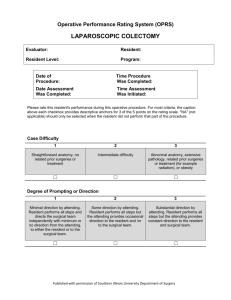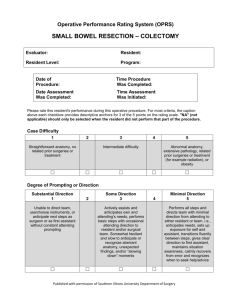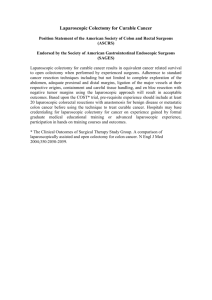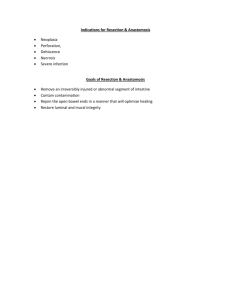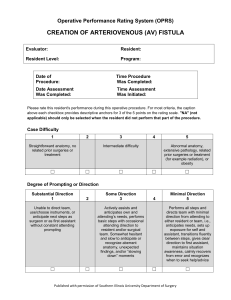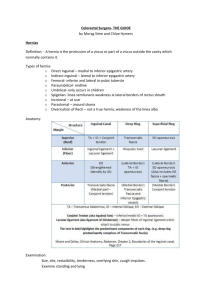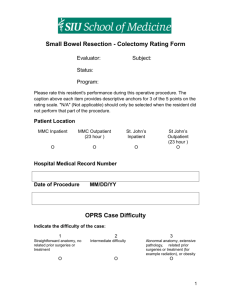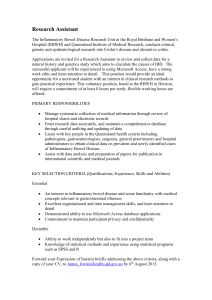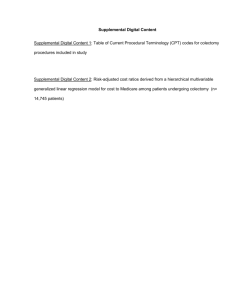LAPAROSCOPIC COLECTOMY
advertisement
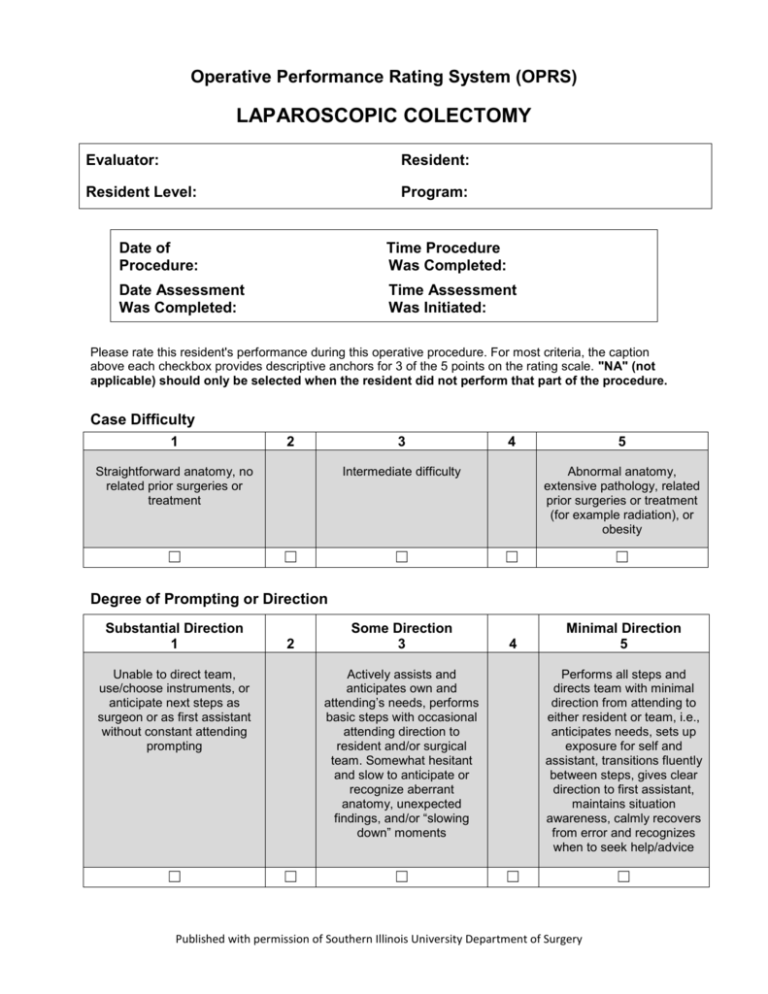
Operative Performance Rating System (OPRS) LAPAROSCOPIC COLECTOMY Evaluator: Resident: Resident Level: Program: Date of Procedure: Time Procedure Was Completed: Date Assessment Was Completed: Time Assessment Was Initiated: Please rate this resident's performance during this operative procedure. For most criteria, the caption above each checkbox provides descriptive anchors for 3 of the 5 points on the rating scale. "NA" (not applicable) should only be selected when the resident did not perform that part of the procedure. Case Difficulty 1 2 3 Straightforward anatomy, no related prior surgeries or treatment ☐ 4 Intermediate difficulty ☐ 5 Abnormal anatomy, extensive pathology, related prior surgeries or treatment (for example radiation), or obesity ☐ ☐ ☐ Some Direction 3 4 Minimal Direction 5 Degree of Prompting or Direction Substantial Direction 1 2 Unable to direct team, use/choose instruments, or anticipate next steps as surgeon or as first assistant without constant attending prompting ☐ Actively assists and anticipates own and attending’s needs, performs basic steps with occasional attending direction to resident and/or surgical team. Somewhat hesitant and slow to anticipate or recognize aberrant anatomy, unexpected findings, and/or “slowing down” moments ☐ ☐ Performs all steps and directs team with minimal direction from attending to either resident or team, i.e., anticipates needs, sets up exposure for self and assistant, transitions fluently between steps, gives clear direction to first assistant, maintains situation awareness, calmly recovers from error and recognizes when to seek help/advice ☐ Published with permission of Southern Illinois University Department of Surgery ☐ Laparoscopic Colectomy – Page 2 Procedure-Specific Criteria Please assess performance and indicate the degree of prompting for each item. The assessment score for each item may differ from the prompting score for that item. Port Placement Poor 1 Fair 2 Poor choice of port position; unsafe technique in insertion or removal ☐ Good 3 Very Good 4 Functional but somewhat awkward port positioning; generally safe technique but some difficulty inserting ports ☐ ☐ Substantial Direction 1 ☐ Excellent 5 NA Optimal positioning of ports for excellent camera view and orientation/angles of working instruments; safe and efficient placement ☐ ☐ ☐ 2 Some Direction 3 4 Minimal Direction 5 NA ☐ ☐ ☐ ☐ ☐ Exposure Poor 1 Fair 2 Continued lack of exposure to the point of significant delays or potential patient harm ☐ Good 3 Very Good 4 Occasional loss of exposure (slowing procedure somewhat but not affecting outcome) due to intermittent loss of pneumoperitoneum, inefficient camera guidance, or direction of retraction ☐ ☐ Substantial Direction 1 ☐ Excellent 5 NA Efficient establishment and maintenance of appropriate pneumoperitoneum, camera angles and retraction ☐ ☐ ☐ 2 Some Direction 3 4 Minimal Direction 5 NA ☐ ☐ ☐ ☐ ☐ Laparoscopic Colectomy – Page 3 Identification and Assessment of Pathology/Disease Process Poor 1 Fair 2 Good 3 Complete reliance on faculty instruction for identification of lesions and associated findings (metastases, local inflammation, infection, etc.) ☐ Very Good 4 Excellent 5 Required some direction to identify segment of bowel for resection, perceived extent of disease with guidance ☐ ☐ Substantial Direction 1 ☐ NA Excellent identification of lesion, affected area of bowel, or metastases by visualization or palpation ☐ ☐ ☐ 2 Some Direction 3 4 Minimal Direction 5 NA ☐ ☐ ☐ ☐ ☐ Dissection Poor 1 Fair 2 Good 3 Unable to safely dissect or mobilize affected segment of bowel. Injured adjacent structures ☐ Very Good 4 Reasonable development of planes of dissection but needed moderate guidance to maintain progress and protect adjacent structures ☐ ☐ Substantial Direction 1 ☐ Excellent 5 NA Meticulous and efficient independent dissection of bowel segment from peritoneal attachments, adhesions or adjacent organs ☐ ☐ ☐ 2 Some Direction 3 4 Minimal Direction 5 NA ☐ ☐ ☐ ☐ ☐ Extent of Resection Poor 1 Fair 2 Selected resection sites that would have left residual disease (would have removed too much healthy bowel, or would have left grossly ischemic bowel ends for anastomosis or stoma creation) ☐ Good 3 Very Good 4 Required some assistance in selecting optimal points of resection to safely remove disease ☐ ☐ Excellent 5 NA Appropriately selected optimal proximal and distal resection sites (adequate margins for cancer, inflammation or perforation), expert handling of mesentery to maintain blood supply and achieve adequate lymphadenectomy (if applicable) ☐ ☐ ☐ Laparoscopic Colectomy – Page 4 Substantial Direction 1 ☐ 2 Some Direction 3 ☐ ☐ 4 Minimal Direction 5 NA ☐ ☐ ☐ Prevention of Contamination Poor 1 Fair 2 Poor technique resulted in avoidable gross contamination from bowel contents ☐ Good 3 Very Good 4 Needed some guidance to contain contamination but demonstrated most appropriate techniques to minimize soiling Excellent 5 NA Independently displayed meticulous preventive measures against intraperitoneal contamination (e.g., took measures to manage the operative field, removal of specimen and soiled instruments) ☐ ☐ ☐ ☐ ☐ Substantial Direction 1 2 Some Direction 3 4 Minimal Direction 5 NA ☐ ☐ ☐ ☐ ☐ ☐ Creation of Anastomosis (stapled or hand-sewn) OR stoma Poor 1 Fair 2 Complete reliance on faculty for appropriate mucosal apposition, avoidance of tension, or torsion ☐ Good 3 Very Good 4 Some guidance needed in creating anastomosis due to concern for apposition of layers, tension on the anastomosis, or orientation of the bowel OR some guidance needed for position/creation of stoma to avoid tension and allow for proper maturation ☐ ☐ Substantial Direction 1 ☐ Excellent 5 NA Independently established excellent apposition of bowel layers and proper orientation of bowel ends to prevent torsion of the mesentery OR excellent position and creation of stoma ☐ ☐ ☐ 2 Some Direction 3 4 Minimal Direction 5 NA ☐ ☐ ☐ ☐ ☐ Laparoscopic Colectomy – Page 5 General Criteria Instrument Handling Poor 1 Fair 2 Tentative or awkward movements, often did not visualize tips of instrument or clips poorly placed ☐ Good 3 Very Good 4 Competent use of instruments, occasionally appeared awkward or did not visualize instrument tips ☐ ☐ Excellent 5 NA Fluid movements with instruments consistently using appropriate force, keeping tips in view, and placing clips securely ☐ ☐ ☐ Respect for Tissue Poor 1 Fair 2 Frequent unnecessary tissue force or damage by inappropriate instrument use ☐ Good 3 Very Good 4 Excellent 5 NA Consistently handled tissue carefully (appropriately), minimal tissue damage Careful tissue handling, occasional inadvertent damage ☐ ☐ ☐ ☐ ☐ Fair 2 Good 3 Very Good 4 Excellent 5 NA Time and Motion Poor 1 Many unnecessary moves ☐ Efficient time and motion, some unnecessary moves ☐ Clear economy of motion, and maximum efficiency ☐ ☐ ☐ ☐ Good 3 Very Good 4 Excellent 5 NA Operation Flow Poor 1 Fair 2 Frequent lack of forward progression; frequently stopped operating and seemed unsure of next move ☐ Some forward planning, reasonable procedure progression ☐ ☐ Obviously planned course of operation and anticipation of next steps ☐ ☐ ☐ Laparoscopic Colectomy – Page 6 Overall Performance (not included in calculation of mean score) Rating of very good or higher indicates technically proficient performance (i.e., resident is ready to perform operation independently, assuming resident consistently performs at this level) Poor Fair Good Very Good Excellent ☐ ☐ ☐ ☐ ☐ Please indicate the weaknesses in this resident’s performance: Please indicate the strengths in this resident’s performance:
